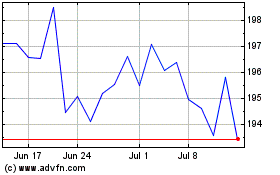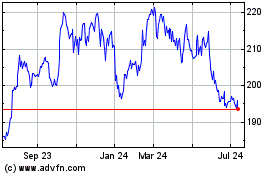Deustche Boerse AG (DB1.XE) said Wednesday that it is advanced
talks with NYSE Euronext (NYX) that could create the world's
largest financial exchange, with dominant positions in trading
derivatives and equities on both sides of the Atlantic.
The proposed all-stock deal comes amid another flurry of
consolidation in an exchange sector challenged by new electronic
rivals and an evolving regulatory landscape that offers rich
rewards for platforms with the cost base and geographic spread to
capture new over-the-counter business.
A deal would represent a victory for Reto Francioni, the
Swiss-born chief executive of Germany's Deutsche Boerse, in his
quest for a transformative acquisition.
Francioni and his NYSE counterpart Duncan Niederauer last held
talks two years ago about a combination. Those talks were sunk by
internal disputes at Deutsche Boerse and disagreements over where
the combined company should be based.
Competition from new trading platforms run by banks and third
parties has since intensified, while consolidation has continued
elsewhere in the sector as exchanges look to boost their
derivatives businesses and expand into higher-margin segments such
as trading technology.
"There are substantial economies of scale and scope in the
trading and clearing business," said Craig Pirrong, a University of
Houston professor of finance who focuses on derivatives markets.
"Here, there are some advantages to being big."
A combination of Deutsche Boerse and NYSE Euronext would have a
dominant role in the European derivatives market and provide a new
beachhead for expansion in the U.S. futures and options sector.
The companies said in a statement that Deutsche Boerse
shareholders would hold around 60% of a new entity. Francioni would
become chairman and Niederauer would assume the CEO role under a
board drawn equally from both companies.
The combined company would be led jointly from New York and the
new Deutsche Boerse headquarters near Frankfurt. It would be
incorporated in the Netherlands.
The global derivatives business would be led from Frankfurt,
with Paris hosting the technology arm and European cash trading.
The global listings operation and U.S. cash trading would be run
from New York, according to people familiar with the situation.
A deal could be announced as early as next week, according to
these people, though regulatory challenges await on both sides of
the Atlantic, according to observers.
"It would be a very complicated deal likely to require a
detailed Phase 2 investigation by the European antitrust
regulator," said Simon Holmes, partner and head of the EU and
Competition department in the London office of international law
firm SJ Berwin.
Joseph Cangemi, chairman of the Security Traders Association,
said his members will be watchful that a new global leader doesn't
use its heft to increase fees.
"With this all happening around us and the small disappearing,
the big cannot take advantage of their size and we need to monitor
that," he said.
The announcement came just hours after the London Stock Exchange
Group PLC (LSE.LN) and Toronto-based TMX Group (X.T) agreed on a
"merger of equals" that would create a transatlantic group heavy in
resource and clean-energy listings, while bolstering trading
technology partnerships.
Last October, Singapore Exchange Ltd. (S68.SG) announced an $8.3
billion offer for all the shares of ASX, the operator of the
Australian Securities Exchange.
Deutsche Boerse and NYSE Euronext said a combination could
generate $300 million in annualized synergies--representing some
10% of their cost base--with potential revenue gains to come from
clearing and cross-selling products.
A combination would extend NYSE's lead as the largest
share-trading venue in the world and add the Frankfurt Stock
Exchange to NYSE's stable of four European bourses and its Big
Board in the U.S.
A combined company would also supplant CME Group Inc. (CME) as
the world's largest futures exchange by contract volume and create
a clear leader in the U.S. options market.
"Going up against this behemoth has got to make even CME
concerned, because today the CME doesn't have an equities
platform," said Gary DeWaal, general counsel of Newedge, among the
world's largest derivatives brokers. "To an extent, the CME is
looking vulnerable."
Linking Deutsche Boerse's bund futures with the gilt futures
offered on NYSE Euronext's U.K.-based Liffe market would give the
combined exchange vast sway over heavily traded interest-rate
futures contracts in the region, creating a formidable competitor
to CME. The Eurex derivative unit of Deutsche Boerse tried and
failed to break CME's monopoly on U.S. rate futures seven years
ago.
It would also bolster positioning in U.S. stock-options trade.
NYSE Euronext's two options platforms, combined with Deutsche
Boerse's International Securities Exchange market, amounted to
about 40.5% of the U.S. options market last month.
The deal also turned attention to Europe, where two major
electronic operators, BATS Global Markets and Chi-X Europe, are in
discussions on their own possible combination.
Deutsche Boerse shares rose 1.7% to 58.42 euros ($79.64) and
NYSE Euronext was recently 13.8% higher at $38.
CME shares were up 0.9% at $305.18. Nasdaq OMX Group Inc. (NDAQ)
led the risers in the buoyant exchange market, climbing 6.2% at
$27.45.
-By Jacob Bunge, Dow Jones Newswires; 312-750-4117;
jacob.bunge@dowjones.com
(Doug Cameron, Kristina Peterson, Donna Kardos Yesalavich,
Brendan Conway and Marietta Cauchi contributed to this
article.)
CME (NASDAQ:CME)
Historical Stock Chart
From May 2024 to Jun 2024

CME (NASDAQ:CME)
Historical Stock Chart
From Jun 2023 to Jun 2024
